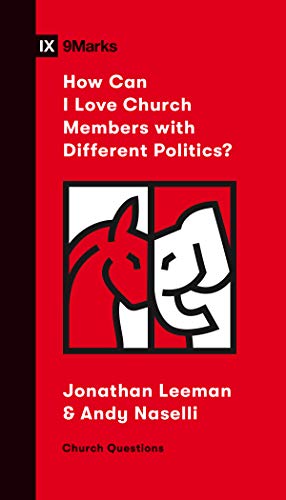A Book Review from Books At a Glance
By Fred G. Zaspel
Few things matter more than politics. That may sound like an overstatement, but it is certainly the case. The political scene shapes society and culture, and it affects our lives in countless ways. And in recent and foreseeable elections much is at stake. And because politics is so important, few topics arouse anger more quickly. You can cheer for the opposing baseball team and be my friend, but if you vote the other way in November friendship will be a challenge!
That’s why Jonathan Leeman and Andy Naselli have written this little booklet. The title assumes the Christian obligation to love one another, and the booklet applies that obligation to Christians who disagree on various political issues.
One major thrust is that many political issues must be left to individual judgment. As Leeman and Naselli illustrate, we might all agree on the obligation to protect children and those who legitimately seek asylum, but there is some distance between affirming these values and defining public policy. And individual perceptions and judgments vary. And without doubt our political process demands certain compromises. We cannot always get all we want all at once, and sometimes we must settle for an incremental approach. And just to add to this complexity, we must acknowledge that individual consciences vary in their respective judgments.
Moreover, we must acknowledge that the world is the world and that, therefore, no political party will be perfect. We might dream of a political party whose stance on the issues is always in keeping with Scripture, but it’s not likely we’ll see such a thing this side of the parousia. And so Leeman and Naselli’s encouragement to pray for wisdom is altogether helpful, as are their exhortations to adjust our expectations of others, to remember what the church is, to recognize what unites us, to respect Christian liberty, to weigh the significance of different issues honestly, to respect our Christian brothers and sisters who differ on disputable matters, and to keep in mind what is most important. This counsel is always highly relevant, and it seems more so in our deeply divided political climate. If we would all but follow these biblical directives, our churches would be much the better for it.
Of course, some questions will remain. There are many “political” questions today whose answers are so clearly given to us in Scripture that the Christian is left with no doubt. Gay marriage, for example, is hardly a supportable option for us. And we would say the same regarding abortion. These are questions of righteousness v. unrighteousness. It would follow, then, that if the Christian is given a vote he ought to vote accordingly.
But what if for concerns on other matters my fellow church member votes left and in doing so supports these clearly unscriptural issues? Yes, we should love him, etc., but should we be so bold as to exhort him? Should we seek to convince him that by his vote he has opposed Scripture? Should stronger measures be taken by the church corporately? Leeman and Naselli do not address these more sensitive matters, and we are left to wonder. I for one can understand the Christian who because of various scruples decides he cannot vote for the party on the right (although I am myself a convinced conservative). But given the seriousness and clarity of certain issues, I cannot at all find a way for a Christian to justify voting left. As one preacher put it bluntly, “God is neither Republican nor Democrat – but he certainly isn’t Democrat.” I agree. The two are not the same, and in fact I might wish Leeman and Naselli had been more clear on this score.
Still, what of my fellow church member who votes Democrat? Leeman and Naselli do not advise us here or explore how the church corporately or the individuals in the congregation should respond to its members who vote the “wrong” way on such important issues. I suppose this is a judgment call also, and individual factors may require varying individual approaches. The authors’ counsel remains relevant, and patience is required.
Leeman and Naselli’s purpose is not to tell us how to cast our vote in the next election or how we should have cast our vote in the last election. Their goal is to tell us how to relate with our brothers and sisters who may vote otherwise. In my judgment their counsel is both sound and necessary – every local church would profit from this little booklet.
Politics matter, and the issues are very worthy of public debate and private discussion. And I do not think that Christians should be silent. We should be willing to discuss matters of right v. wrong as well as political strategy – how a Christian influence can best be realized. But God save us from politically divided churches.
